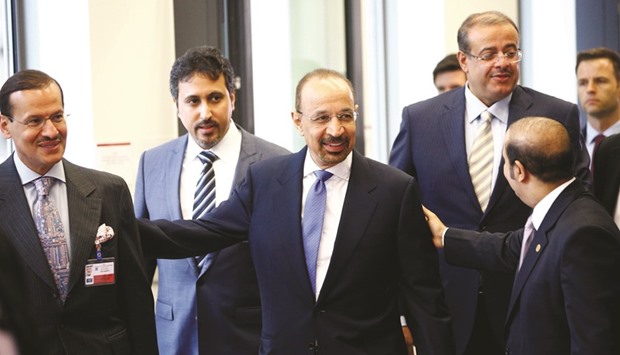Between Saudi Arabia’s new oil minister and the rest of Opec, a fragile peace reigns.
Khalid al-Falih, who replaced Ali al-Naimi a month ago, faced a daunting premiere on the world stage at Opec’s 169th ministerial gathering in Vienna.
It took what Ed Morse of Citigroup Inc called a “publicity blitz” for al-Falih to ensure that Thursday’s assembly would run smoothly. That included pre-meeting head-to-head confabs with representatives from six member countries plus cozy dinners and meet-and-greets with consultants who advise hedge funds and oil traders.
Even Bijan Namdar Zanganeh, Iran’s oil minister, was won over, at least for now. After four years of quarrelling, Tehran and Riyadh parked their differences at the door and agreed on a new secretary-general for the group, Mohammed Barkindo of Nigeria.
“We had a meeting without any tension,” Zanganeh said in an interview in Vienna on Friday. “We should work with each other, we are neighbours, we are counterparts in Opec,” he said, referring to Saudi Arabia and other Gulf Arab states.
The calm is tentative. Vienna’s atmosphere of bonhomie had as much to do with oil prices flirting with a six-month high of $50 a barrel as it did al-Falih’s overtures. Wide differences among Opec nations remain, especially when it comes to restoring the production targets that were scrapped in December. And Thursday’s meeting, for all its ballyhooed friendliness, produced no new policy pronouncements.
Al-Falih, 56, is Saudi Arabia’s first new oil minister in more than 20 years. He took over as Opec members’ resentment toward the kingdom erupted. In April, countries that favoured a freeze in production levels blamed Saudi Arabia for sinking it; the same month, al-Falih’s boss, Deputy Crown Prince Mohammed bin Salman, said the kingdom didn’t care whether oil prices were at $30 or $70, sending a shock wave through Opec members such as Venezuela, whose faltering economy is dependent on higher prices; and just a few weeks ago, Saudi Arabia’s long-time rivalry with Iran exploded into public finger-pointing at a preparatory meeting in Vienna.
It had gotten so bad that critics were wondering whether the Saudis envisioned a continued purpose for Opec. Al-Falih turned that around.
“Al-Falih clearly still sees a role and need for Opec, even in a world of shale oil,” said Jamie Webster, a fellow at the Center on Global Energy Policy at Columbia University in New York.
As Al-Falih was making the right noises in Vienna, the Saudi state-owned oil company announced its first-ever contract to supply refiners in the Baltics – another example of the intense campaign for market share.
Al-Falih began his diplomatic tour after arriving in Vienna before everyone else. He landed Monday night and went straight to his suite on the top floor of the luxurious Hyatt Hotel, skirting the media - something his predecessor rarely did.
Early the next morning, he visited nearby Opec headquarters to meet the group’s secretary-general. Al-Falih delivered the message that Opec was important for Saudi Arabia, according a person briefed on the conversation who asked not to be named because the discussions weren’t public.
Al-Falih made it clear that, contrary to public speculation, the kingdom was still engaged with Opec, wanted to listen to the diverse views of its members and would be flexible in its approach, the person said.
Over the next two days – and with the support of the king’s son, the Deputy Oil Minister Prince Abdulaziz bin Salman – Al-Falih delivered the same message of cooperation in bilateral discussions with representatives of Nigeria, Venezuela, Algeria, Qatar, Kuwait and the UAE.
After a one-hour get-together on Wednesday, Venezuela’s Eulogio del Pino, who often clashed with al-Naimi, told reporters he had “an excellent meeting” with the new Saudi minister.
In an apparent easing of tensions created at the Doha meeting – when Saudi Arabia blocked a freeze deal because Iran wouldn’t participate while it was still restoring exports that had been choked by sanctions – Zanganeh said on Friday that all Opec members now “accepted the return of Iran to the market.”
Al-Falih, in his first extended remarks to reporters since becoming minister last month, delivered a conciliatory message before the ministerial meeting began.
“Saudi Arabia realises that price is a key part of the oil- market formula – it balances supply and demand,” he told reporters. “We realise that a long time under lower prices doesn’t bring enough supply to meet the rise in demand.”
He added later that $50 a barrel wasn’t a high enough price to encourage investment in new production capacity – music to the ears of Opec counterparts such as Venezuela.

Saudi Arabia’s Energy Minister Khalid al-Falih (centre) arrives for the meeting of Opec oil ministers in Vienna, Austria on Thursday. Al-Falih, 56, is Saudi Arabia’s first new oil minister in more than 20 years. He took over as some Opec members’ resentment toward the kingdom’s oil policy erupted. But al-Falih made it clear that, contrary to public speculation, the kingdom is still engaged with Opec, wanted to listen to the diverse views of its members and would be flexible in its approach.
